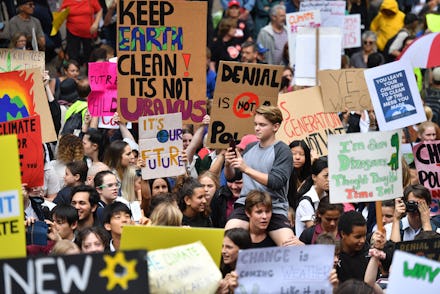2020 candidates are finally taking climate change discussions beyond plastic straws

For years, as more and more science has confirmed that human activity is destroying the planet, the suggested responses have been frustratingly small-scale. Initiatives to recycle, reduce, reuse, the introduction of plastic straw bans, and the commitments to eating less meat, walking more, and using energy-efficient lightbulbs were supposedly the solutions to an ocean filled with plastic, a sky filled with smog and wrought with storms, and land that is either flooded or on fire.
But we’ve long known that paper straws and vegan burgers won’t solve the climate crisis. And at a CNN town hall on Wednesday night, where 10 of the 2020 Democratic presidential candidates were in attendance, that fact was finally acknowledged by some of the most powerful politicians in the country.
The town hall in and of itself was a victory: a seven-hour forum dedicated entirely to climate change that allowed audience members to ask the candidates about their positions in detail. The event was a concession to activists who demanded an official debate from the Democratic National Committee devoted to climate change — a request the DNC denied.
But despite the national party apparatus’ refusal to debate climate change seriously, the candidates themselves displayed a refreshing willingness to discuss the “climate crisis,” as CNN called it, in terms larger than an individual’s straw habits. All 10 candidates who took the stage — Sens. Elizabeth Warren, Bernie Sanders, Cory Booker, Kamala Harris, and Amy Klobuchar, as well as former HUD Secretary Julian Castro, former Rep. Beto O’Rourke, former Vice President Joe Biden, South Bend Mayor Pete Buttigieg, and entrepreneur Andrew Yang — readily connected the climate crisis to the need to regulate the planet's worst polluters. The biggest differentiator instead was how exactly each candidate planned to do that.
Warren, who has outlined clean energy and green infrastructure as the pillars of her climate plan, emphasized the existential risks of unaddressed climate change. When asked about the high costs of the Green New Deal, including the burden of switching from fossil fuels to alternative forms of energy, she responded: “Look around and see what happens if we don’t make change. We’ve got what? 11 years, maybe? To reach a point where we cut our emissions in half. And that’s not just America — we’re only 20 percent of the problem.”
The Massachusetts senator went on to explain that the debates we’re having over canvas tote bags and energy-efficient lightbulbs pale in comparison to the gas, coal, and oil industries, which contribute nearly three-quarters of worldwide pollution. “There are a lot of ways that we try to change our energy consumption, and our pollution,” Warren said of individual measures like reusable straws and canvas tote bags. “But understand that this is exactly what the fossil fuel industry hopes we’re talking about.”
O’Rourke also directly attacked industries responsible for pollution, though he stopped short of actually supporting the carbon tax, which would levy a fee on carbon emissions in order to deter pollution. Most climate activists believe such a tax is an essential step, and O’Rourke is one of three candidates who haven't endorsed that tax.
As Wired observed, the candidates also played up the personal side of the climate debate. Buttigieg, who is openly religiously observant, invoked faith during his time on stage by painting the pollution driving so much of the climate crisis as an affront to God: "You know, if you believe that God is watching as poison is being belched into the air of creation, and people are being harmed by it, countries are at risk in low-lying areas, what do you suppose God thinks of that?" Biden, the Democratic frontrunner, was questioned about a fundraising event he had planned with a fossil fuel executive for the next day, which he addressed by denying that the executive was still connected to fossil fuels. (The man in question, Andrew Goldman, co-founded a natural gas company but no longer has “day-to-day” responsibilities.)
Sanders, thought to be one of the strongest challengers to Biden, echoed Warren’s message that the planet will face dramatic consequences without immediate action. “We are fighting for the survival of the planet Earth — our only planet. How is this not a major priority?” But while he linked the Green New deal to cuts in military spending, he fell short of his competitors by declining to outline clearly how he'd go about reallocating defense funds toward the climate crisis. The idea is notable, given that the U.S. military is one of Earth’s biggest polluters, and several experts have detailed proposals to that effect, but the candidate himself has yet to endorse any specifics.
Castro, who has lagged in the polls, was the only candidate to specifically focus on what’s known as “environmental racism.” The principle posits that the climate crisis is most severely impacting predominantly low-income, Black, and Brown communities, and Castro proposed a plan to open the legal system as a resource for those populations.
“Too often, it is people who are poor, communities of color, who take the brunt of storms that are getting more frequent and more powerful,” Castro said. “So my plan actually calls for new civil rights legislation to be able to address environmental injustice.” The idea would make environmental issues a civil rights issue by law.
While the night lacked consensus among the top Democrats as to how exactly to combat the climate crisis, the fact that each of them was challenged on the merits and details of their individual approaches signals progress. The event made clear that no longer is vaguely stating that you believe anthropogenic climate change exists enough, and that the conversation is at least shifting from “What can I do to prevent climate change?” to “What are those in power going to do to stop climate change, and how can we hold them accountable?”
But in the meantime, we should all definitely keep recycling and carrying reusable tote bags.